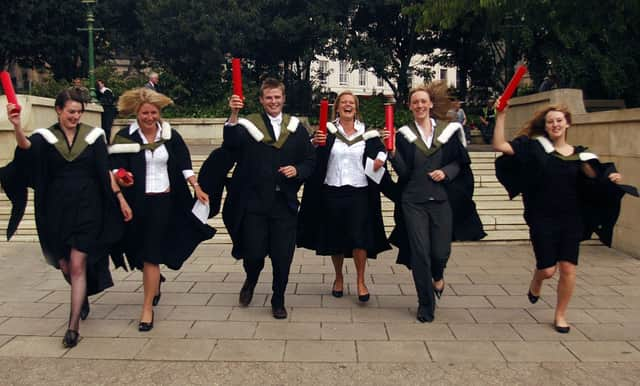Chris Marshall : pressures mount on undergraduates


At that time – the late 1990s – there was anger at the introduction of tuition fees, later to be replaced by the short-lived graduate endowment, but an undergraduate degree remained a time not only for education, but for self-discovery and – for our grant-abusing forebears at least – fun.
Let’s spare a thought, then, for the current crop of undergrads.
Advertisement
Hide AdAdvertisement
Hide AdWhile Scottish students studying in their home country are exempt from fees, they are not protected from an economic downturn which has made finding a graduate job harder than ever.
Things are even harder for the thousands of students who come here from the rest of the UK, paying up to £9,000 a year in fees for the privilege.
In the 1990s we cursed our parents, who had blithely walked into jobs for life after completing their studies debt-free in the Sixties and Seventies.
But in comparison to today’s students, even we had it easy.
Apart from the odd day spent at the student newspaper and the cursory trip to the careers service a week before graduation, I didn’t lose too much sleep worrying about my career in between (or during) lectures.
But it seems that today’s students think about pretty much nothing else.
According to a survey published last week, 52 per cent of students in Scotland cited “salary prospects” as their primary reason for going into higher education, up from 36 per cent in 2004.
While Scottish students worried less about money than their fee-paying counterparts elsewhere in the UK, more than three-quarters of respondents said they spend less than £20 a week on socialising.
Advertisement
Hide AdAdvertisement
Hide AdMost depressing of all was the statistic that 58 per cent of students expect debts in excess of £20,000 on graduation, while 20 per cent predict they will owe more than £40,000.
It is clear that changes in the job market, allied to the marketisation of higher education, have altered our universities irreversibly.
Inevitably, students paying £9,000 a year in fees, and sometimes more, will be looking for a return on their sizeable investment and everyone else is forced to pull their socks up accordingly.
This new spirit of industriousness means that even arts students are forced to visit the library more than once a term – it’s OK, I can say that, I was one – and those generous summer holidays are eaten up by placements, internships or just working to make ends meet.
Fifteen years on, I still look back on my student days with fondness. Let’s hope those now finishing their degrees are able to do the same in years to come.